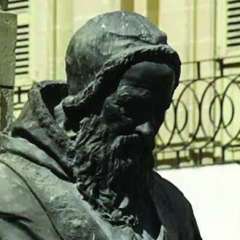Претражи Живе Речи Утехе
Showing results for tags '“the'.
Found 3 results
-

St. Bonaventure - “The Seraphic Doctor”
тема је објавио/ла Bernard у Dijalog sa braćom rimokatolicima
Today, July 15, marks the feast day of St. Bonaventure, who is called “The Seraphic Doctor” of the Church. St. Bonaventure is known for his leadership of the Franciscans and his great intellectual contributions to theology and philosophy. St. Bonaventure was born in Bagnorea in Tuscany, Italy. He is widely believed to have been born in the year 1221, although some accounts say 1217. Sources recount that in his youth, St. Bonaventure was cured of a dangerous illness by the intercession of St. Francis of Assisi. He went on to join the Franciscan Order of Friars Minor in 1243. After making his vows, he was sent to complete his studies in Paris. He was taught first by Alexander of Hales, an English doctor and Franciscan, and later by John of Rochelle. While in Paris, he became good friends with St. Thomas Aquinas, with whom he received the degree of Doctor. He also developed a friendship with St. Louis, King of France. In 1257, St. Bonaventure was chosen to serve as the superior of the Friars Minor. In this position, which he filled for 17 years, he brought peace and order. His impact was so great that today he is sometimes referred to as the second founder of the Franciscans. Taking on the position after a period of extraordinary expansion for the order, St. Bonaventure worked to preserve a spirit of unity. He calmed the threat of internal dissension that arose over differences in interpreting the message of St. Francis of Assisi. Central to this work was his understanding that the study of philosophy and theology did not oppose the call to poverty that was so central to Franciscan spirituality. St. Bonaventure proposed a unified and collected text regulating the daily life of the Friars Minor. The text was accepted and ratified in 1260 by the General Chapter of the Order in Narbonne. Wishing to present an authentic image of the life and teaching of their founder, he zealously collected documents about St. Francis of Assisi and heard testimonies of those who had actually known him. From this information, he compiled a biography of the saint that was adopted as his official biography by the General Chapter of the Friars Minor in 1263. St. Bonaventure also wrote numerous mystical and ascetical treatises, most famously, “The Soul's Journey into God.” In 1273, he was appointed by Pope Gregory X as Cardinal and Bishop of Albano. The Pope also asked him to help prepare the Second Ecumenical Council of Lyons, an ecclesial event aimed at re-establishing communion between the Latin and Greek Churches. St. Bonaventure worked to prepare the Ecumenical Council, but never saw its completion. He died on July 15, 1274, while the council was still in session. He was canonized in 1482 by Pope Sixtus IV. In his General Audience on March 3, 2010, Pope Benedict XVI spoke about the life of St. Bonaventure. He called to mind the great works of literature, art, philosophy and theology that were inspired by the Christian faith during the time period in which the saint lived. “Among the great Christian figures who contributed to the composition of this harmony between faith and culture Bonaventure stands out, a man of action and contemplation, of profound piety and prudent government,” Pope Benedict said. The Pope called on the faithful to take note of “the central role that Christ always played in Bonaventure's life and teaching,” and to imitate the way in which “the whole of his thinking was profoundly Christocentric.” "Meditation on Christ in His humanity is corporeal in deed, in fact, but spiritual in mind. . . . By adopting this habit, you will steady your mind, be trained to virtues, and receive strength of soul....Let meditation of Christ's life be your one and only aim, your rest, your food, your desire, your study." - St. Bonaventure -
Saint Fulgentius of Ruspe (c 462 – 533) “The Pocket Augustine” Posted on January 1, 2020 Saint of the Day – 1 January – Saint Fulgentius of Ruspe (c 462 – 533) Abbot, Bishop of the city of Ruspe, Roman province of Africa, North Africa in modern day Tunisia, Theologian, Writer- known as “The Pocket Augustine” – born Fabius Claudius Gordianus Fulgentius in c 462 at Carthage, North Africa (modern Tunis, Tunisia) and died on 1 January 533 in Ruspe of natural causes. He is venerated today and on 3 January by the Augustinians. He was born to a Roman senatorial family, and was well educated. His father Claudius, died while Fulgentius was still quite young. His mother, Mariana taught him to speak Greek and Latin. He became so good at Greek, that he spoke it like a native and committed all of Homer to memory. He was also well trained in Latin literature. As he grew older, he managed his house wisely in subjection to his mother and Fulgentius quickly gained wide respect for his conduct of the family affairs. This reputation helped him to acquire a post as a civil servant in the government of Rome, as a procurator of Byzacena. He quickly grew tired of the provincial life. This, together with his studies of religion, particularly a sermon of Saint Augustine of Hippo on Psalm 36, led to his being attracted to a religious life and he entered a monastery, became a monk, then was Ordained and became Abbot. At the time, the Arian persecutions had ceased but the election of Catholic bishops was forbidden. In 508 it became necessary to defy the law when bishops were consecrated, Fulgentius being chosen for Ruspe (modern Kudiat Rosfa, Tunisia). He was exiled with 60 other bishops to Sardinia. There they built a monastery and continued to write, pray, and study. Fulgentius was invited back to Carthage by the Arian king Thrasimund to hold a debate with his Arian replacement around 515 and so successfully refuted his Arian opponents that he was exiled again in 518. King Hilderic succeeded Thrasimund in 523 and permitted the exiles to return. Peace finally being restored to the African church, Fulgentius returned to his Diocese. He would have preferred to return to his monastery and resume his studies but he was such a popular preacher, he was kept busy in the pulpit until his death. As a Bishop, he followed Augustine’s example in living in community with the clergy of his Diocese. He founded several other monasteries in Africa. When he was exiled to Sardinia, not wanting to be away from the monastic community life, he even founded monasteries there. Various letters and eight sermons survive. Fulgentius’s work shows his vast knowledge of Greek and a strong influence and agreement with Saint Augustine, so much so, that he is known as “The Pocket Augustine.” He wrote frequently against Arianism and Pelagianism. Saint Fulgentius died of natural causes in 533 at Ruspe. Some of his relics are located at Bourges, France. St Fulgentius truly aimed to live a life in conformity with St Augustine’s precept: “Everything outside of us fluctuates with the storms and temptations of this age. But we need an interior desert, where we gather ourselves and live of our faith.” … (Sermo 47,25)
- 1 нови одговор
-
In an episode of “The Archpastor” TV program (Yekaterinburg), Bishop Irinej of Bačka (Serbian Orthodox Church) spoke about various topics. Here is what he had to say on the Ukrainian issue: “We deeply regret that the Ecumenical Patriarch in his personal capacity, and the Ecumenical Patriarchate as a whole, have (in my opinion and in the opinion of the majority of our theologians and hierarchs), made the greatest mistake in the whole history of the Ecumenical Throne of the Patriarchate of Constantinople. I say it here for the first time, I have never said this before to the media: Ten years ago, maybe more, I told the ecumenical patriarch privately that I urged him not to interfere in the Ukrainian issue, because that would provoke an immense tragedy, not only there, but in the whole Orthodox world. I am not a prophet, but I knew enough about the situation and history, that it was easily predictable. Unfortunately, he did it. It is difficult to say for what reasons. Some consider it could be because of some grievance, a bitter feeling against the Patriarch of Moscow and against the Russian Church, due to their absence at the Council of Crete, but many also think it is the result of the pressure from the West, especially from the Americans, and that it is only a part in the general course of Western policy regarding Ukraine, and an attempt to further deepen the gap, to break apart the Russian world, and to ensure that Ukraine and Russia are not only separate, but enemy states. I fear that this may be true, at least partly. It is interesting that this opinion is shared also by some of my Greek friends, who have no reason to be at the service of the Church of Moscow. The Ecumenical Patriarchate thus made an absolutely uncanonical decision – or at least a decision that is not based on canons: to enter the territory of an already existing Church, the Ukrainian autonomous Orthodox Church, through negotiations with Ukrainian political power. As you know, Ukrainian political leaders are not very Orthodox: there are Orthodox in the parliament, but also Uniates and schismatics. The course of action is quite strange: the Ecumenical Patriarchate delegation does not discuss with the legitimate local Church, which is the majority in Ukraine. For the legitimate Church, the nationality of their members (whether Ukrainian, Russian, etc.), is not important. There is no national or political connection, but only the feeling of the ecclesial people that they are one church, as it has been along centuries. They do not prevent anyone from being Ukrainian or whatever – it is difficult to say how many nations are present in the Russian Church, one hundred, one hundred and fifty. [The Constantinople delegates] have not even visited Metropolitan Onufriy once. All their discussions took place with politicians and schismatics. And we are not talking here of occasional schismatics, but about people like Filaret Denisenko, who was once a candidate to become the new patriarch of Moscow. But he did not become a patriarch, for known reasons – his personal and moral life, and other factors. At first, he was opposed to Ukrainian separatism (at the level of the Church and other levels), far more than many in Ukraine. But then, when he was not elected patriarch, he remembered he was Ukrainian. And of course, his broke his oath to the patriarch not to create a schism, and he did create one anyway. He was then reduced to the lay state, excommunicated and anathematized. And now, the people of the Phanar come and say this is rubbish: “We acknowledged it [the Moscow decision], but we no longer do.” I read a letter from the Ecumenical Patriarch in which he writes to the Patriarch of Moscow that he recognizes and supports his decision, and that it cannot be otherwise. And now he says now that his own act is invalid. It is impossible in our Church. This is why our Church has made the decision of supporting the Russian Orthodox Church, especially in regard to the Ukrainian issue. Unfortunately, in Constantinople and in some circles, they think it’s odd. They say that the Serbs who had always been devoted to them and had fraternal relationships with them have now betrayed them and gone with the Russians. This reflects a very unhealthy feeling of ecclesial life. The Church is one, it is the divine and human body of Christ, it is the temple of the Holy Spirit, and the house of the heavenly Father. It is not an ideological, political, or social organization. Autocephaly is not an ontological, but administrative concept. It is a mode of organization for the Churches in the world. Autocephalous Churches are not separate Churches: it is a mode of organization for the one and unique Church. In this sense, we cannot accept this approach, in which we see ourselves as Greek Orthodox, Phanariots, and that over there, there are Muscovites, Slavs, etc. No: the Church is one. There are no Hellenes, no Greeks, no Russians, no Serbs, we are all one, if we are Orthodox. If we do not understand this, we are not Orthodox enough. When we are accused of having become Russians, or servants of the Russians, I consider this is not healthy, this is not ecclesial. We are not against one another, nor for one another. We take into consideration the canonical order. A healthy ecclesial life, that’s what we are interested in. If what Constantinople is doing now had been done by Moscow or Kyiv, we would also react against them. We cannot be against other for selfish reasons or goals. Things can happen, to us or to other Churches, that exists. But here, we consider that Constantinople acted in an unfair and, unfortunately, irresponsible way. They hurt not only the Russian or the Ukrainian Church, but also themselves and the whole Orthodoxy. And we are getting humiliated and ridiculed, by Roman Catholics and followers of other religions, and even by people without any religion. Unfortunately, this has been caused by Constantinople unilateral actions. https://orthodoxie.com/en/the-patriarch-of-constantinople-has-made-the-greatest-mistake-in-the-history-of-the-ecumenical-throne/?fbclid=IwAR19WFsa1I9CjC2AtFTlbStAMiHb_E01fJ-2TKvvqO7SPrMoKOF5RSg5e2s
Све поруке на форуму, осим званичних саопштења Српске Православне Цркве, су искључиво лична мишљења чланова форума 'Живе Речи Утехе' и уредништво не сноси никакву материјалну и кривичну одговорност услед погрешних информација. Објављивање информација са сајта у некомерцијалне сврхе могуће је само уз навођење URL адресе дискусије. За све друге видове дистрибуције потребно је имати изричиту дозволу администратора Поука.орг и/или аутора порука. Коментари се на сајту Поуке.орг објављују у реалном времену и Администрација се не може сматрати одговорним за написано. Забрањен је говор мржње, псовање, вређање и клеветање. Такав садржај ће бити избрисан чим буде примећен, а аутори могу бити пријављени надлежним институцијама. Чланови имају опцију пријављивања недоличних порука, те непримерен садржај могу пријавити Администрацији. Такође, ако имате проблема са регистрацијом или заборављеном шифром за сајтове Поуке.орг и Црква.нет, пошаљите нам поруку у контакт форми да Вам помогнемо у решавању проблема.
![]() © ☦ 2021 Сва права задржана.
© ☦ 2021 Сва права задржана.


